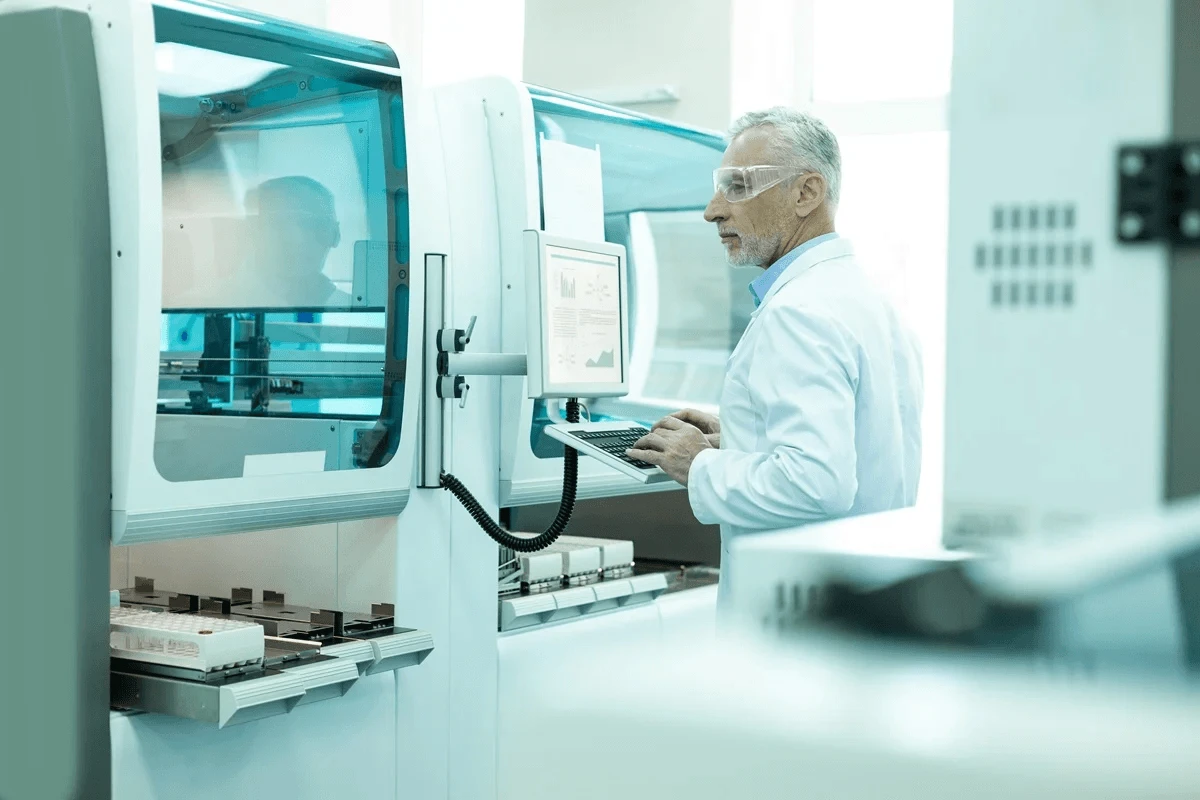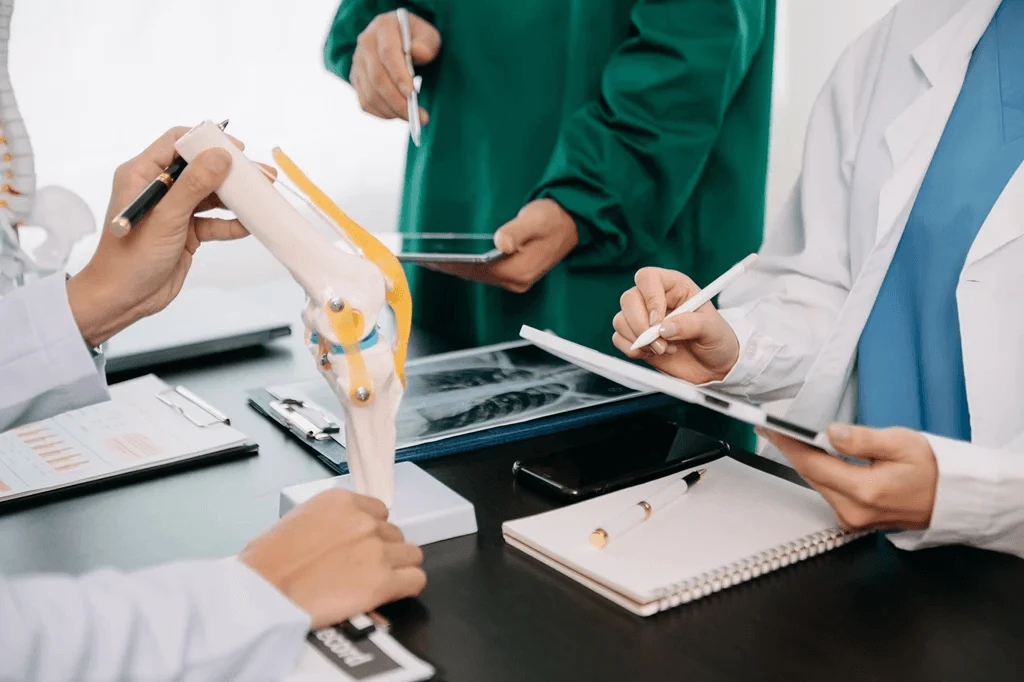The medical device analytical testing outsourcing market is experiencing rapid growth, driven by increasing regulatory requirements and the need for specialized expertise. There has been a notable surge in demand for these services as medical device manufacturers seek to streamline their development processes and reduce costs.
This blog post explores the current state of the market, the types of testing services commonly outsourced, and the benefits and challenges associated with this approach.

How Big Is the Medical Device Testing Outsourcing Market?
Market Size and Growth Trends
The medical device testing outsourcing market is experiencing explosive growth. As of 2022, the market was valued at USD 5.66 billion. Industry experts project this figure to reach USD 10.57 billion by 2030, with a compound annual growth rate (CAGR) of 8.2%.
This rapid expansion stems from several factors. The increasing complexity of medical devices, combined with stringent regulatory requirements, has made in-house testing both challenging and expensive for many manufacturers. As a result, more companies now turn to specialized outsourcing partners to ensure compliance and quality.
Key Players Shaping the Industry
A handful of major players dominate the market, including SGS, Eurofins Scientific, and Charles River Laboratories. These companies have established themselves as leaders in the field due to their extensive expertise and state-of-the-art testing facilities.
However, the industry also sees a rise in specialized niche providers. These smaller firms often focus on specific types of testing or cater to particular segments of the medical device industry. This diversification creates more options for manufacturers and drives innovation in testing methodologies.
Factors Fueling the Outsourcing Trend
Several key factors propel the growth of medical device testing outsourcing:
- Cost Pressures: Manufacturers, especially in developed markets like the U.S., face intense pressure to reduce costs. Outsourcing testing can significantly lower expenses compared to maintaining in-house facilities.
- Regulatory Complexity: The FDA and other regulatory bodies continually update their requirements. Outsourcing partners stay up-to-date with these changes, ensuring compliance without manufacturers having to invest in constant training and education.
- Technological Advancements: The integration of AI, IoT, and other cutting-edge technologies in medical devices requires specialized testing expertise that many manufacturers lack in-house.
- Global Market Access: Outsourcing partners often have a global presence, helping manufacturers navigate the complex regulatory landscapes of different countries and regions.
- Focus on Core Competencies: Medical device companies can concentrate on their core strengths of innovation and product development through outsourcing testing.
Regional Market Dynamics
Interestingly, the Asia Pacific region leads the charge in medical device testing outsourcing. In 2022, this region accounted for a whopping 40.69% of the global market share. This dominance largely results from the rapid development of healthcare infrastructure in countries like India and China.
North America follows closely behind, driven by its robust medical device industry and stringent regulatory environment. The U.S., in particular, sees a surge in outsourcing as companies grapple with the FDA’s evolving standards (including the complex ISO 10993 guidelines for biocompatibility testing).
As the medical device industry continues to evolve, the outsourcing market will likely become increasingly sophisticated. Manufacturers will seek partners who can offer end-to-end solutions, from initial design validation to post-market surveillance testing. This trend presents significant opportunities for testing providers to expand their service offerings and for medical device companies to streamline their development processes.
The next chapter will explore the various types of medical device testing services that companies commonly outsource, providing insights into the specific areas where external expertise proves most valuable.

What Testing Services Do Medical Device Companies Outsource?
Medical device manufacturers increasingly rely on specialized outsourcing partners for various testing services. This trend stems from the need for expertise in complex regulatory environments and the desire to streamline development processes.
Biocompatibility Testing
Biocompatibility testing ensures that medical devices are safe for use in or on the human body. Recent market data shows that material characterization (a key component of biocompatibility testing) accounted for 18.2% of the outsourcing market revenue in 2022.
Outsourcing partners typically offer a range of biocompatibility tests, including:
- Cytotoxicity
- Sensitization
- Implantation studies
These tests help meet FDA and ISO 10993 requirements. External expertise allows medical device companies to navigate the complex landscape of biocompatibility testing more efficiently.
Mechanical and Electrical Safety Testing
Mechanical and electrical safety testing encompasses a wide range of tests to ensure devices function safely and reliably under various conditions. This may include:
- Strength and durability assessments
- Electrical safety evaluations
- Electromagnetic compatibility (EMC) testing
The complexity of modern medical devices (particularly those incorporating IoT and AI technologies) has increased the demand for specialized electrical safety testing. Outsourcing partners often possess the advanced equipment and expertise necessary to conduct these tests effectively.
Sterilization Validation
Sterilization validation ensures the safety of medical devices, particularly those that come into direct contact with patients. This area of testing has seen significant growth in outsourcing, with the sterilization and bioburden testing segment expected to show one of the fastest growth rates in the coming years.
Outsourcing partners typically offer various sterilization methods, including:
- Ethylene oxide (EtO)
- Gamma irradiation
- Electron beam sterilization
They also provide comprehensive validation services to ensure the effectiveness of these sterilization processes.
Software Validation and Cybersecurity Testing
As medical devices become increasingly software-driven, the need for robust software validation and cybersecurity testing has grown exponentially. This area requires highly specialized expertise that many medical device manufacturers may not have in-house.
Software validation ensures that device software functions as intended and meets all regulatory requirements. Cybersecurity testing focuses on identifying and mitigating potential vulnerabilities that could compromise patient safety or data security.
The FDA’s increased focus on cybersecurity in medical devices has made this type of testing even more important. Outsourcing partners can help manufacturers navigate these complex requirements and ensure their devices meet the highest standards of software reliability and security.
The range of testing services outsourced by medical device companies continues to expand. From biocompatibility and safety testing to sterilization validation and cybersecurity assessments, outsourcing partners play a vital role in bringing safe, effective medical devices to market. As we explore the benefits and challenges of outsourcing medical device testing in the next section, we’ll uncover why more companies are turning to external partners for these critical services.

Weighing the Pros and Cons of Medical Device Testing Outsourcing
Cost Savings and Specialized Expertise
Medical device manufacturers often choose outsourcing to reduce costs. A Deloitte study revealed that companies can save up to 30% on operational expenses through strategic outsourcing. This translates to substantial savings on equipment, personnel, and facility maintenance for medical device manufacturers.
Outsourcing partners typically possess specialized expertise that’s costly to maintain in-house. For example, SGS (a leading testing company) employs over 89,000 specialists across various fields. This extensive knowledge base allows manufacturers to access cutting-edge testing methodologies without the overhead of continuous training and recruitment.
Accelerated Time-to-Market and Regulatory Compliance
The medical device industry moves at a rapid pace, and speed to market can determine a product’s success. Outsourcing testing can significantly reduce development timelines. A Boston Consulting Group report indicates that effective outsourcing can shorten product development cycles by up to 30%.
Regulatory compliance is another area where outsourcing excels. The FDA’s 510(k) clearance process requires extensive testing documentation. Experienced outsourcing partners understand these requirements well, which can reduce the risk of delays or rejections. In 2022, the FDA received 3,340 510(k) submissions, highlighting the volume of devices that require thorough testing and documentation.
Quality Control and Intellectual Property Concerns
Outsourcing offers many benefits but also comes with risks. Quality control remains a top concern for many manufacturers. An Axendia Institute survey found that 55% of life sciences companies cited quality as their primary concern when outsourcing.
Intellectual property (IP) protection is another critical issue. The World Intellectual Property Organization reported over 3.3 million patent applications in 2021, underscoring IP’s importance in the medical device industry. When outsourcing testing, companies must carefully vet partners and implement robust confidentiality agreements to protect their innovations.
Overcoming Communication and Cultural Barriers
Effective communication plays a crucial role when outsourcing testing services. Time zone differences, language barriers, and cultural nuances can all impact project outcomes. A Project Management Institute study found that ineffective communication is the primary contributor to project failure in one-third of cases.
To mitigate these risks, many companies turn to nearshore or onshore outsourcing options. This approach can reduce communication challenges while still providing cost benefits. Outsource Philippines offers a unique blend of cultural compatibility and cost-effectiveness, making it an attractive option for many U.S.-based medical device companies.
Embracing the Future of Medical Device Testing Outsourcing
The medical device analytical testing outsourcing market is set to expand as regulatory requirements grow more complex and technological innovation accelerates. Manufacturers will increasingly rely on specialized outsourcing partners to navigate these challenges and efficiently bring innovative products to market. Additionally, the integration of artificial intelligence in testing processes and the rise of personalized medicine will open new opportunities for outsourcing providers to develop specialized expertise.
As companies look to outsource medical device testing, they must carefully evaluate potential partners. It is essential to select providers with a proven track record of regulatory compliance, robust quality management systems, and expertise in specific device categories. Clear communication and well-defined expectations are critical to establishing successful outsourcing relationships.
Given the growing demand for quicker time-to-market, manufacturers will actively seek agile outsourcing solutions. Partners who can adapt to changing regulations and leverage AI will not only streamline testing but also enhance product quality. This collaboration will enable medical device companies to effectively navigate compliance challenges while driving innovation in a competitive landscape.

Streamline Your Operations with Outsource Philippines
The medical device analytical testing outsourcing market is rapidly expanding due to increasing regulatory demands and the need for specialized expertise. As manufacturers look to optimize their development processes and cut costs, outsourcing has emerged as an effective solution, addressing the complexity of medical devices and stringent regulations.
Outsource Philippines is your ideal partner for these needs, offering a wide range of services designed to enhance efficiency and reduce operational costs. Our dedicated team of skilled professionals focuses on quality, compliance, and customer satisfaction, allowing you to concentrate on your core competencies while we manage the complexities of outsourcing. Partner with Outsource Philippines to successfully navigate industry challenges and drive your success through strategic outsourcing solutions.










